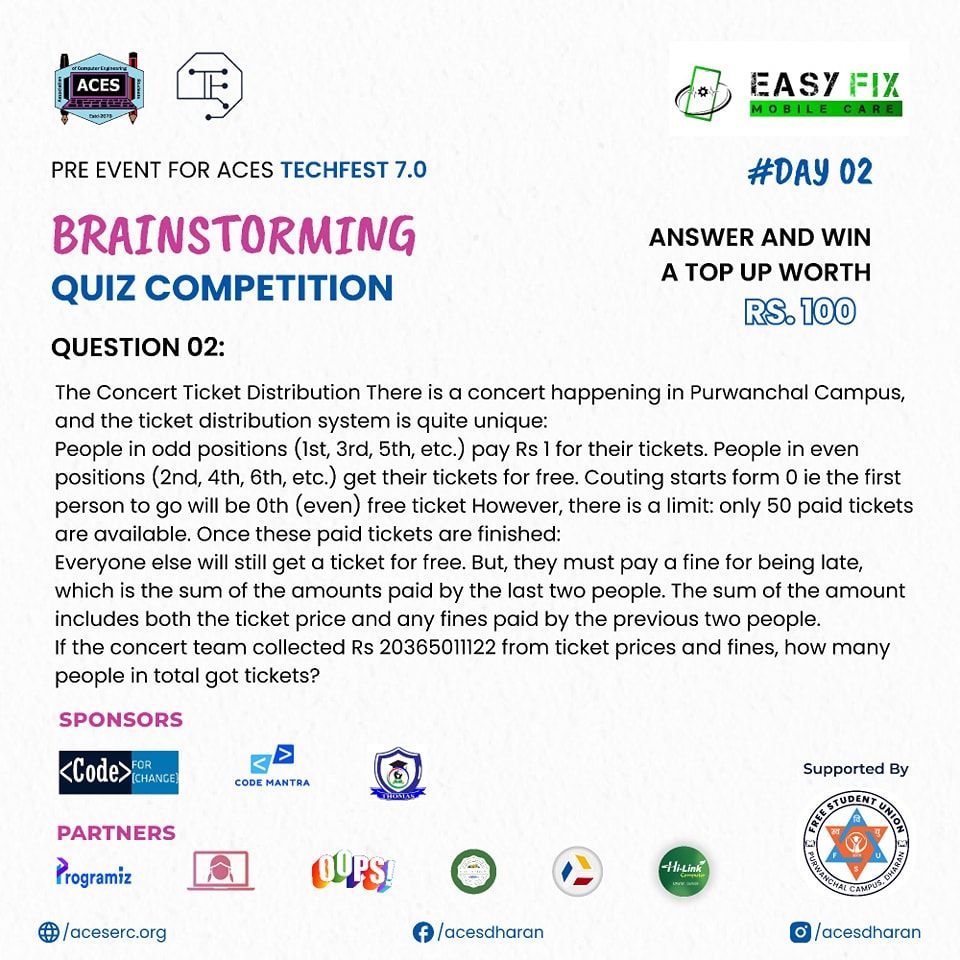Brainstorming Quiz - Day 2 Solution
This is the solution to the Brainstorming Quiz for Day 2 of Techfest 7.0. The problem involves calculating how many people received tickets in a concert where odd-positioned people pay for tickets and even-positioned people get them for free.

Tilak Thapa
Wed, Dec 4, 2024
5 min read

The approach to solving this problem involves a combination of mathematical reasoning and iterative computation using the Fibonacci sequence. Here's a step-by-step breakdown of the approach:
Answer: 148
1. Understanding the Ticket Distribution:
- Odd-positioned people (1st, 3rd, 5th, etc.) pay Rs 1 for their tickets.
- Even-positioned people (2nd, 4th, 6th, etc.) get tickets for free.
- There are 50 paid tickets available, meaning a maximum of 50 odd-positioned individuals pay for their tickets.
2. Calculating Total Collected Amount:
- The total amount collected is Rs 20,365,011,122.
- A part of this amount comes from the 50 paid tickets, each contributing Rs 1. Therefore, the total collected from paid tickets is Rs 50.
- The remaining amount (Rs 20,365,011,072) is collected through fines.
3. Fines Based on Fibonacci Sequence:
- The fine for each subsequent person is calculated based on the Fibonacci sequence:
- The 0th person (the first in line) has a fine of Rs 0.
- The 1st person (second in line) has a fine of Rs 1.
- The 2nd person (third in line) has a fine of Rs 1.
- The 3rd person (fourth in line) has a fine of Rs 2, and so on.
- The fine amount for each person follows the Fibonacci pattern, where each new fine is the sum of the previous two fines.
4. Iterative Process:
- Start by calculating the total amount collected from the paid tickets.
- Calculate the remaining amount (the fine amount) that needs to be collected to reach the total amount.
- Begin iterating through the sequence of people. For each person, the fine is determined using the Fibonacci sequence.
- After calculating each person's fine, subtract it from the remaining fine amount.
- Keep track of the number of people who received tickets, including both paid and free ticket holders.
5. Final Calculation:
- Once the total fine amount is collected, the program outputs the total number of people who received tickets.
#include <iostream>
using namespace std;
// Define constants for easy adjustments
#define MAX_PAID_TICKETS 50 // Number of paid tickets available
#define COLLECTED_AMOUNT 20365011122 // Total amount collected from fine and tickets
// Function to calculate the nth Fibonacci number iteratively
long long fibonacci(int n)
{
// Base cases for Fibonacci sequence
if (n == 0)
return 0; // Fibonacci(0) is 0
if (n == 1)
return 1; // Fibonacci(1) is 1
// Variables to hold the previous two Fibonacci numbers
long long fib1 = 0, fib2 = 1, fib3 = 0;
// Compute the nth Fibonacci number iteratively
for (int i = 2; i <= n; i++)
{
fib3 = fib1 + fib2; // Fibonacci calculation (sum of the previous two numbers)
fib1 = fib2; // Update fib1 to the previous fib2
fib2 = fib3; // Update fib2 to the current fib3 (which is fib1 + fib2)
}
return fib3; // Return the nth Fibonacci number
}
int main()
{
// Calculate the initial amount collected from the paid tickets, subtracting 1 because we will assume the position where the paid ticket finish and previous from that as the starting point for fibo series,
long long total_amount_collected = MAX_PAID_TICKETS - 1;
// Calculate the remaining amount to be collected through fines
long long fine_amount = COLLECTED_AMOUNT - total_amount_collected;
// Initialize the total number of people who received tickets , double of paid tickets available ie odd and even and we are subtracting 2 from it because as we told, fibo series will count the two subtracted users
long long people_count = MAX_PAID_TICKETS * 2 - 2;
// Start calculating fines
long long position = 0;
// Log the initial state
cout << "Initial state: " << endl;
cout << "Paid Tickets Collected: Rs " << total_amount_collected << endl;
cout << "Fine Amount to be Collected: Rs " << fine_amount << endl;
cout << "People Count: " << people_count << endl;
cout << "---------------------------------" << endl;
// Loop until the remaining fine amount is collected (when fine_amount becomes 0)
while (fine_amount > 0)
{
// Calculate the fine for the current position based on Fibonacci sequence
long long fine = fibonacci(position); // Fibonacci fine for the current person
// Subtract the calculated fine from the remaining fine amount
fine_amount -= fine;
// Log the progress after each person's fine
cout << "Position " << position + (MAX_PAID_TICKETS * 2 - 2) << ": Fine = Rs " << fine << ", Remaining Fine = Rs " << fine_amount << endl;
// Increment the total number of people that received tickets
people_count++;
// Move to the next person and update the position
position++;
}
// Output the total number of people who received tickets
cout << "---------------------------------" << endl;
cout << "Total number of people who got tickets: " << people_count << endl;
return 0;
}